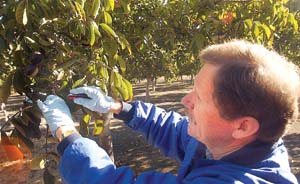After the light sprinkling of rain drops over the weekend, San
Benito County walnut growers are quickly getting ready to harvest,
and thanks to the research of one man, they’re bringing in a lot
more nuts than years past.
Hollister – After the light sprinkling of rain drops over the weekend, San Benito County walnut growers are quickly getting ready to harvest, and thanks to the research of one man, they’re bringing in a lot more nuts than years past.
Bill Coates, a farm advisor for University of California Cooperative Extension (UCCE), specializes in nut and fruit trees in San Benito County, and for the past 24 years he’s been trying to rid the walnuts from their No. 1 enemy – the husk fly.
“What happens is the fly lands on the hull (layer outside of the shell) and lays eggs under the surface,” Coates said. “Those eggs hatch into maggots and they eat the hull.”
This can become a quality issue and a financial burden for growers if they sell their walnuts unshelled. The decay from the maggots can discolor and rot the shells, which means they can’t be sold.
Mark Gibson, of Gibson Farms, grows organic walnuts. Because of the limited use of pesticides in organic growing, Gibson’s walnuts were having a difficult time making it through the growing season until Coates introduced him to organic approved insecticides.
“A few years ago, I had about 90 percent damage,” Gibson said. “Without the new organic materials, it was going to be impossible to control that pest.”
Gibson manages roughly 25 percent of the 1,900 acres of walnut trees in the county. Since working with Coates, he’s managed to drop his damage to 2 percent, and said he’s gained back at least $25,000 in revenue since learning how to control the fly.
His pest problem was fixed by spraying his orchards with light drops of an insecticide called GF120, which is an organic bait spray that lures the flies away from the hulls and onto the droplets instead. Coates and his colleague Bob Van Steenwyk developed insecticides that used an ingredient called Spinosad, which is a natural bi-product, meaning it’s OK to use for organic growing.
Since beginning to work on the husk fly problem in 1980, Coates began developing organic solutions in 1995, and along with the GF120, he’s also tested out two other types.
Along with battling the fly, Coates is also working with commercial walnut growers and developing new ways of fighting off the nut’s other nemesis, the coddling moth. The same moth that infects pears and apples, it lays its eggs on leaves near the nuts, and once hatched, the worms burrow into the shell and get into the nut, according to Coates. During the past few years, he’s worked with growers to develop reduced risk insecticides, which makes things safer for farmer workers, consumers and the environment.
While his research is being used throughout the entire state, Coates said it all starts here in San Benito County, and the growers here may be guinea pigs for his experiments, but they get to see the positive results first.
San Benito County Agriculture Commissioner Paul Matulich agrees.
“Having him here is extremely valuable as far as I’m concerned,” he said. “He does a terrific job helping local growers, and it’s great having him here in our backyard.”









